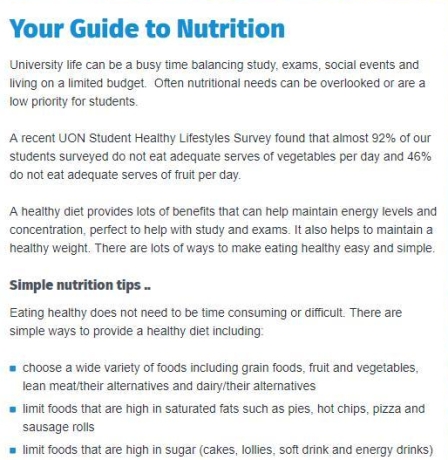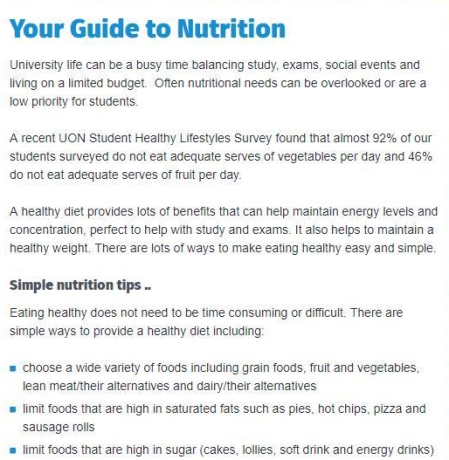In a world full of Paleo, Vegan, Atkins, and Ketogenic diets, the requirements for a balanced, nutritious and healthy diet are incredibly hard to follow, especially as a University student. How are you supposed to drink 8 glasses of water, have 5 servings of vegetables and eat 8,700 kilojoules in one day when you have to attend lectures, classes, and work? The solution? McDonalds and Two-Minute Noodles.
Throughout my research I intend to investigate several things in relation to the nutrition intake and to hopefully find an outcome that gives me more insight on the dietary habits of University students. The inspiration for this topic stems from a long battle within myself and how I personally find it hard to take part in a healthy eating routine. Relating this topic to the student experience as a whole, I began to wonder if this is something other University students struggle with. If I struggle with the limitations of my back account and what is defined as “healthy food” when I live at home, how do students who live away from home feel about the topic of nutrition and clean eating? So, after all those thoughts muddle into one, I came up with the very vague question of –
“Throughout the student experience, how do the eating habits differ from the students who live at home from those who live on campus or in share houses?”
In terms of my research on this topic, it appears that there is a very limited amount of information on the topic of healthy eating specifically related to University students in Australia. There are select examples that I can use, such as University of Newcastle, which has a small paragraph of information on their website shortly describing a guide to nutrition and demonstrates ways that University students can make their eating habits better.

The study conducted by the University of Newcastle that shows approximately 92% of their students did not eat the recommended intake of vegetables, and only 42% ate their recommended daily intake of fruit. This only confirmed my theory that it is incredibly hard for University students to not only eat a balanced diet. This alarms me for several reasons, the main one being, are people just ignorant to the fact that it is incredibly hard for University students to be able to afford ingredients to make nutritious meals? Let alone have the time to prepare such meals?
One aspect I plan to investigate is the difference between dietary behaviour between University students that live at home in comparison to those who live on campus. This is an important aspect of my research because transitioning from living at home and having meals cooked for you to living away from home and cook your own meals is a very big step, especially for those who live on campus in their first year after high school. The easy solution to this problem is quick and easy meals such as two-minute noodles and simply buying food from fast food outlets such as McDonalds. As we are all ingrained with from a young age, poor eating habits can affect the mindset of students and decrease their ability to perform as well as they could throughout their degree. “Poor food habits during this stage can result in serious consequences that can be further aggravated by physical stress and emotional problems.” (Liang, 1992)
The study by Hui-Qi Liang looked into the dietary practices of students that lived on campus at the University of Wollongong, although the thesis was published in 1992, so the outcomes could potentially be very different almost 20 years later. The publication states that at that time, 41% of students ate takeaway meals when they weren’t attending University. The study also highlights that 38% of students put their reason for not having a balanced and nutritious down as a financial problem. This could highlight the similarities between the students who live on campus at this present time, as financial difficulties are very common throughout University students living not only on campus but also at home and in share houses.
This further confirms my theories that it is incredibly hard for University students to find time or sufficient amount of funds to eat a balanced diet 100% of the time, and the simplicity of buying takeaway food is much more of a convenience than planning a meal that ensures that you get the correct amount of proteins, vegetables, carbohydrates etc. My research will be able to tell me if there is:
- A problem in which majority of University students aren’t eating their recommended dietary intake
- The cause of the lack in healthy dietary habits
- How students go about planning out their meals in order to establish a healthy eating routine
References:
Liang, H. (1992). Dietary practice and nutrient intake of students living in the college accommodation of Wollongong University. University of Wollongong Thesis Collection.
www.newcastle.edu.au 2018. Your Guide to Nutrition. [online] Available at: https://www.newcastle.edu.au/current-students/support/health-counselling-and-wellbeing/your-guide-to-nutrition [Accessed 14 Mar. 2018].
